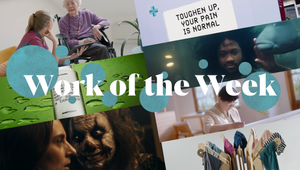
4 Ways Insights Can Help You Produce More Meaningful Creative

In this article, I want to discuss how we can facilitate creative thinking that will have a genuine positive impact, not just in the advertising and marketing space, but also in the wider world. Insight is #1.
When studying English literature and creative writing, our professor told us that creativity is made up of three things: 1. observation, 2. memory and 3. imagination.
The Cambridge Dictionary’s definition of observation is to “notice or perceive (something) and register it as being significant.” In the context of PR, advertising, and marketing: ‘observation’ equals insights.
While we must use step two (memory) to remember the successes and failures of previous campaigns, and step three (imagination) to do something new, leading with one (observation / insight) is a vital step.
Anyway, you clicked on this article to find out four ways insights can help you produce more meaningful creative, so here goes:
1. They help you understand the real world problems you want to solve
Good insights will enable us to pinpoint something that needs to change. This pain point could be on a brand, industry or societal level. Whatever the scale is, if there’s an issue that needs resolving, this is an opportunity to find a creative solution.
Alternatively, if your advert, campaign, or slogan exists in a vacuum, cut off from the rest of the world, then it’s unlikely to resonate with the public. Even if this works as a one-off, it’s unsustainable as audiences quickly tire of brands that only ever ‘take’. The goal should always be to serve people by doing at least one of the big four: inspire, persuade, educate, or entertain. Without context, it’ll be a struggle to do any one of these.
2. They help you to be (almost) as smart as your audience
Brands survive on audience approval and engagement; therefore, ‘giving back’ shouldn’t stop at finding creative solutions to problems. It should also apply to intelligence.
Thanks to the internet and social platforms like Twitter facilitating mass forums, people are collectively the smartest they’ve ever been (and granted, equally, the stupidest). Therefore, we must use insights to meet audiences with the most clued up perspectives we can manage in return.
So don’t reel out the same boring stats everyone already knows. Give people something new. Shock them. Film writers are taught to always assume their audience is smarter than them, and to never over explain. This can be seen as a mantra for all creatives to live by, because one creative team or brand will always be outnumbered by the rest of the world.
3. They help you break out of the echo chamber
Insights form the awareness that enables us to push for positive change and avoid causing harm.
In his novel ‘Nineteen Eighty-Four’, George Orwell writes that: “Those who control the present, control the past and those who control the past control the future.” While this was intended as a statement on censorship and propaganda, at an individual level, it highlights how our own narratives — whether wrong or right — shape our present reality, and future trajectory.
Given your colleagues have all ended up working in the same industry, at the same company as yourself, you’re likely to share a lot of similar life experiences, perspectives, and values. Therefore, without awareness from insights, you’re at greater risk of forming echo chambers and generating content that is out of touch and behind the times.
We have a moral responsibility to research and understand the cultures and contexts we’re engaging with, as opposed to forcing a narrative on them. If it’s our job to change perceptions, then it’s also our job to understand the impact this will have.
4. They prevent time wasting (TLDR)
For those of you who skipped straight to the end of the article, this one’s for you.
Ultimately, taking some time to observe what is currently happening and what needs to happen will save everyone time in the long run. Gaining insights doesn’t mean spending days procrastinating and convincing yourself you’re making progress on ideas. It means stopping creative paths that won’t work in their tracks, so you’re free to explore ones that *would* work, with less risk of wasting time.
Think of using insights as being like bowling with the railings up; your creative ideas can still bounce around, but they’ll keep moving forwards to knock down at least some of your targets.
So in short, insights = creative fuel.
At Manifest, we’re lucky to have an insights team to do a lot of the heavy lifting and help define those railings to keep a project focused from the offset, but it’s still always key for each creative to do their own digging.
Anyone who’s ever embarked on any creative research will know that there are infinite ways to do so — to the extent that two creatives could explore the exact same topic and come back with entirely different findings. Being able to cross-reference and sense check is key to being able to find killer insights that facilitate some best in class creative.
Ultimately, by researching and gaining new information first, we can inspire passion and creativity in the most productive way possible, with less room for a change of hearts further down the line.
“Inspiration does exist but it must find you working.” — Pablo Picasso.












